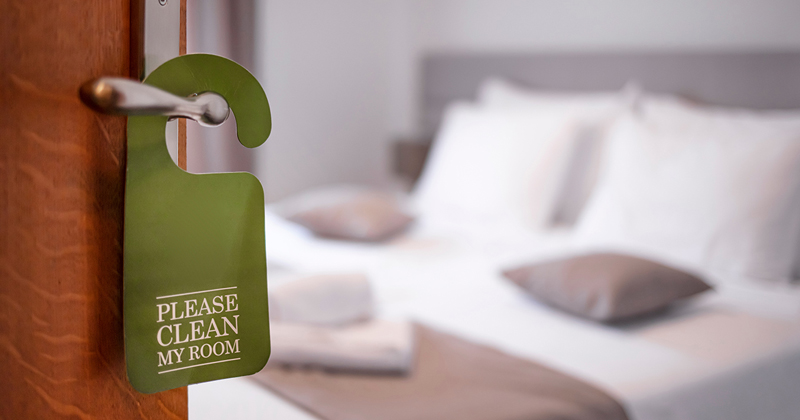


Are eco-friendly hotels inconvenient?
Photo by Shutterstock March 14, 2024
UD-led research shows attitudes may be shifting on environmentally friendly travel
With the possible exception of those people who still seem to think it’s OK to throw their McDonald’s bag out the car window, most people like to be seen as environmentally conscious — or at least reasonably respectful of the planet.
But is that lip service to look good in front of others, or do they actually favor environmentally friendly brands when it comes to spending money? That’s a question behind new research coming out from Srikanth Beldona, professor of hospitality business management in the University of Delaware’s Alfred Lerner College of Business and Economics.
Beldona has previously found evidence that people are willing to pay more for products and services labeled as sustainable, he said, but recent research has been murky on that point when it comes to travel.
Beldona’s article with Farhad Tabatabaei, a doctoral student in the Hospitality Business Analytics program at the Lerner College studying consumer behavior and sustainability, is titled “Are eco-friendly hotels inconvenient? An Implicit Association Test.” It was published in the March issue of the Journal of Hospitality and Tourism Management.
Emissions from jet fuel and other fossil fuels have made travel notorious for its contributions to climate change. But accommodations like hotels also account for a significant chunk of climate impact, the study notes, and consumers are becoming ever more aware of climate issues.
Hotels have begun offering a number of tweaks aiming to offset this, like the option to clean linens less often during a stay, refillable shampoo bottles, and so on. But some research, the article said, suggests eco-friendly steps aren’t actually a selling point — people may assume these changes result in lower quality or less convenience. Other studies find more favorable attitudes.
Part of the issue driving the mixed results of the research, Beldona thinks, is social desirability bias, which means essentially that on sensitive topics, people tend to censor their opinions and say things they think will make them sound better. A lot of previous research on eco-friendly travel has relied on opinion surveys, which are vulnerable to this kind of bias.
To counter this, Beldona and Tabatabaei turned to the implicit association test, which taps into subconscious attitudes by asking people to quickly associate concepts, actions and items. It’s a tool frequently used to evaluate racial bias.
In this case, test subjects were asked to consider hotel practices like changing linens every three days, using sustainable design, conserving water and equipping rooms with smart thermostats. (To clarify, the study did not weigh in on whether hotels earned the rigorous Leadership in Energy and Environmental Design, or LEED certification. It just examined the specific practices.)
In addition to social pressure, other tensions intrude when it comes to practices like these. Travel is unique, Beldona reflected.
“We travel to basically get out of home, get out of routine … we want to cut loose,” he said. But how will consumers react if they’re trying to do that and a hotel is pushing environmental issues like touting the fact that they’re saving on water?
“People tend to say, ‘I’m paying for this … the flow of water should be strong,’” Beldona said, or they might complain about smart thermostats because it takes a little bit for the room to heat up or cool down after they walk in.
Because of the so-called “green gap,” when people don’t say what they really feel about the environment, Beldona and Tabatabaei expected the implicit association test to show negative attitudes toward these kinds of hotel practices. But the test indicated that while people did, in fact, talk a better game than their actual beliefs, they still had a generally positive view of these environmentally friendly tweaks to the hotel experience.
Tabatabaei contended that the detailed analysis of seven distinct sustainability initiatives revealed that “energy saving fixtures” are considered the most convenient, and “linen change once every three days” was deemed the least convenient for consumers in the hotel, providing actionable insights for hotel managers aiming to enhance the customer experience. He emphasized the positive shift in attitude as contrasting with previous research.
As to why people’s attitudes might be evolving, Beldona said further study is needed on that, but it’s likely influenced by all the media coverage of climate change. He also thinks more research is needed to replicate the findings on hotels, and would like to do a followup study to measure ongoing change.
“I think this is something that needs to be measured on a regular basis to conclusively say that there has been a shift in customer attitudes towards responsible travel,” he said.
Contact Us
Have a UDaily story idea?
Contact us at ocm@udel.edu
Members of the press
Contact us at 302-831-NEWS or visit the Media Relations website

